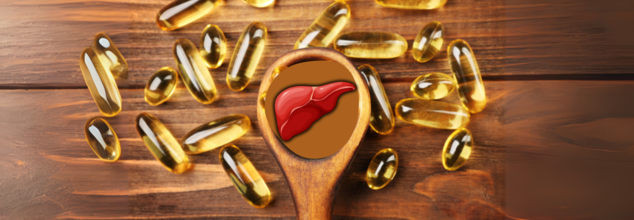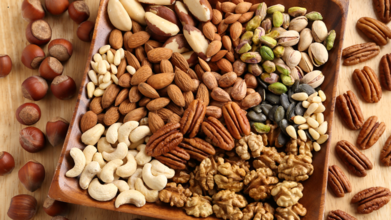- Health Conditions A-Z
- Health & Wellness
- Nutrition
- Fitness
- Health News
- Ayurveda
- Videos
- Medicine A-Z
- Parenting
- Web Stories
Popular Supplements 'Used By Millions' Linked To Surge In Liver Failure: Is Your Nutritional Label Hiding Deadly Risks?

You rise early, blend your smoothie with kale and protein, head to the gym, and pop a daily multivitamin or a trending herbal supplement — all in pursuit of a healthier, longer life. This wellness routine, so familiar to millions, is rooted in the belief that taking supplements bridges the gap left by diet and lifestyle. But what if this daily ritual is quietly sabotaging your liver?
A growing body of research suggests that some of the most popular over-the-counter supplements — often perceived as safe because they're "natural" — may be doing more harm than good. In fact, a disturbing rise in liver failure cases linked to dietary and herbal supplements is now forcing health experts to sound the alarm.
Before diving into the danger zones of supplement ingredients, it's crucial to understand the silent but vital role your liver plays.
Located just below the rib cage, the liver is the body’s powerhouse. It filters toxins from the blood, processes nutrients, produces bile for digestion, and plays a key role in regulating the immune system. When overloaded, particularly with substances it wasn't evolved to process in high concentrations — such as chemically potent or ultra-concentrated botanical supplements — the liver can become inflamed, scarred, and eventually, fail.
This condition, known as toxic hepatitis or drug-induced liver injury, is now at the center of a growing public health concern — especially in the wake of the pandemic-era supplement boom.
A peer-reviewed study dating back to 2010 already revealed troubling trends: over 40,000 Americans report liver damage annually due to medications and supplements, with more than 2,000 deaths attributed to severe liver failure. Fast forward to today, the numbers have only escalated.
According to a 2022 study published in the journal Liver Transplantation, the percentage of patients added to the liver transplant waitlist due to supplement-related liver failure has soared — from 2.9% in 1995 to a staggering 24.1% in 2020.
Yet, the popularity of herbal supplements continues to skyrocket, particularly among young adults and wellness-focused individuals seeking “natural” alternatives to conventional medicine.
What Is Toxic Hepatitis?
Toxic hepatitis is essentially liver inflammation triggered by chemical exposure. According to the Mayo Clinic, it can be caused by alcohol, industrial chemicals, certain medications, or — critically — nutritional supplements.
When the liver cannot effectively metabolize a compound, especially if taken in high concentrations, toxic byproducts can accumulate in the body. Over time, this toxic buildup can lead to scarring (cirrhosis), irreversible liver damage, or in extreme cases, liver failure.
While some cases resolve when the supplement is discontinued, others require hospitalization or liver transplantation. Here’s where things become particularly concerning: in the U.S., the Food and Drug Administration (FDA) does not regulate dietary supplements with the same scrutiny as pharmaceutical drugs.
That means supplement manufacturers are not required to prove efficacy or safety before their products hit the shelves. Unlike medications, they do not need pre-market approval, and labeling inaccuracies are common.
So, when you take that trendy turmeric capsule or green tea extract pill, you may have no real idea what you're ingesting — or how it might affect your liver.
6 Popular Supplements Tied to Liver Damage
In a new 2024 study published by JAMA Network, researchers identified six commonly consumed supplements that are linked to cases of drug-induced liver injury:
- Turmeric
- Green tea extract
- Ashwagandha
- Garcinia cambogia
- Red yeast rice
- Black cohosh
These ingredients are often marketed with lofty claims: boosting metabolism, reducing anxiety, improving mood, aiding digestion, or promoting fat loss. Yet, when taken in potent doses or in combination with other supplements, their effects on liver health can be devastating.
The same study revealed that over 15.6 million Americans are currently consuming supplements containing at least one of these botanicals — often without any medical supervision.
The Culture of “Self-Medicating” with Supplements
According to a 2024 survey by the Council for Responsible Nutrition, nearly 3 in 4 U.S. adults use supplements, and 4 in 5 said they’d rather take supplements than prescription medications. This cultural shift toward “natural healing” may have unintended consequences.
With wellness influencers, social media ads, and even healthcare blogs pushing new “super supplements” daily, many consumers feel confident in bypassing doctors altogether. But experts urge caution.
“People think if it’s sold in a health store or online with positive reviews, it must be safe,” says Dr. Rachel Klein, a hepatologist based in New York. “But your liver doesn’t care about marketing — it reacts to biochemistry. And when overloaded, it shuts down.”
Why You Should Rethink Your Supplement Routine?
A study by the American Association for the Study of Liver Diseases in 2017 found that up to 20% of liver toxicity cases in the U.S. were caused by dietary or herbal supplements. And the trend shows no signs of slowing.
One of the major challenges is that many supplements contain multiple ingredients, making it nearly impossible to isolate the exact cause of liver damage without extensive clinical testing.
That turmeric pill you picked up may also contain piperine to increase bioavailability, or your green tea extract may be paired with caffeine or other stimulants — all of which add to the liver’s burden.
Protecting Your Health in the Age of “Natural” Wellness
As consumers, we are navigating a wellness landscape where flashy packaging and influencer endorsements often eclipse scientific scrutiny. But when it comes to liver health, ignorance isn't just risky — it's potentially fatal. Here’s what health experts recommend:
- Talk to your doctor before starting any supplement regimen.
- Avoid high-dose or multi-ingredient formulations unless prescribed.
- Report unusual symptoms like fatigue, abdominal pain, dark urine, or yellowing of the skin — early signs of liver trouble.
- Look for third-party testing certifications when purchasing supplements.
In a world where supplements are marketed as magic bullets for everything from weight loss to stress relief, it's tempting to believe more is better. But when it comes to your liver, more can be deadly.
If you're part of the millions relying on supplements for health, the first step is simple: flip the bottle, read the label — and then call your doctor. Because when the organ that filters everything starts to fail, there may be no label warning that can save you.
3 Types of Sugar That Commonly Trigger IBS Symptoms

Credits: Canva
Irritable bowel syndrome (IBS) affects an estimated 12% of the U.S. population, causing symptoms such as abdominal cramps, bloating, diarrhea, and constipation. While some individuals experience only mild discomfort, others find their daily life disrupted by the condition. Despite its prevalence, IBS remains complex, with no single known cause.
Doctors and dietitians increasingly advise patients to focus on identifying and avoiding specific food triggers, particularly sugar.
Why Sugar Can Be a Gut Trigger
When you eat sugar, your small intestine breaks it down using specific enzymes. Once processed, the sugar is absorbed into the bloodstream for energy. But for people with IBS, this process can go awry.
Some may lack sufficient enzymes to digest certain sugars, resulting in digestive distress. Others may have altered gut bacteria or hormonal fluctuations that make their digestive system more sensitive. Not all sugars cause issues for everyone with IBS, so identifying personal triggers is a crucial step in managing the condition.
The Worst Offenders: High FODMAP Sugars
Many sugars that worsen IBS symptoms fall into a category known as high FODMAP foods, short for fermentable oligosaccharides, disaccharides, monosaccharides, and polyols. These are carbohydrates that are poorly absorbed in the small intestine and can ferment in the colon, leading to gas, bloating, and other IBS symptoms.
Sucrose (Table Sugar):
Common in desserts, baked goods, and even savory packaged foods, sucrose is made of glucose and fructose. It’s one of the most frequently used sweeteners and a known trigger for some people with IBS.
Fructose:
Found naturally in fruit and added to many sugary beverages and snacks, fructose is another major culprit. High-fructose fruits like apples, grapes, and pears, along with honey and agave, may worsen symptoms. Safer alternatives include citrus fruits, cantaloupe, and berries.
Lactose:
A sugar found in milk and dairy products, lactose requires the enzyme lactase for digestion. Many adults don’t produce enough lactase, which can lead to lactose intolerance—especially problematic for people with IBS.
Are Sugar Substitutes Any Better?
Many people with IBS turn to sugar-free alternatives, but not all substitutes are safe bets.
Sorbitol and Xylitol, often found in sugar-free gum and candy, are known to trigger abdominal cramps and diarrhea in people with IBS. While stevia may be a safer alternative, more research is needed. Even natural sweeteners like honey or agave should be approached with caution due to their high fructose content.
It’s Not Just Sugar: Other Foods to Watch
Sugar isn’t the only food that may cause trouble. Other common IBS triggers include:
- Beans and lentils
- Cruciferous vegetables (like broccoli and cauliflower)
- Onions and garlic
- Gluten
- Chocolate and spicy foods
- Fried or processed foods
- Caffeine and alcohol
An elimination diet guided by a registered dietitian may help pinpoint which of these are problematic.
Could It Be Sucrose Intolerance?
In some cases, symptoms similar to IBS may actually be caused by congenital sucrase-isomaltase deficiency (CSID), a rare genetic disorder. People with CSID lack the enzymes needed to digest sucrose and maltose, leading to symptoms like bloating and diarrhea immediately after eating sugar-containing foods. This condition is usually diagnosed in childhood and can lead to developmental issues if not managed.
Sweet Solutions for IBS Relief
Living with IBS doesn’t mean you have to completely give up sweets, but moderation and awareness are key. Some people find they can tolerate small amounts of certain sugars without triggering symptoms, while others need to avoid them entirely.
Are Nuts Really Good For Your Heart?

Credits: Canva
Don’t be fooled by their size, nuts are nutritional powerhouses that may offer major benefits for your heart. High in healthy fats, protein, vitamins, and minerals, these plant-based snacks are increasingly being linked to reduced risk of cardiovascular disease, better cholesterol levels, and even reduced inflammation.
Backed by research from institutions including the British Heart Foundation and several clinical trials, nuts like almonds, walnuts, macadamias, and even peanuts (technically legumes) are showing potential to improve heart health when eaten regularly, just a few handfuls a week may do the trick.
What the Research Says
A 2020 study involving three large cohorts looked at the cardiovascular effects of increasing nut intake to at least half a serving daily over a four-year period. The results were clear: people who consumed more nuts had significantly lower risks of key cardiovascular conditions.
- 8% lower risk of cardiovascular disease
- 6% lower risk of coronary heart disease
- 11% lower risk of stroke
The most benefits were seen with increased consumption of tree nuts, walnuts, and peanuts. Interestingly, participants who decreased their nut intake over the same period were found to be at a higher risk for these conditions.
Even more promising: replacing red meat, refined grains, and even desserts with nuts was associated with a 7% to 13% lower risk of cardiovascular events.
Better Cholesterol Without the Weight Gain
A separate 2021 clinical study looked at 52 adults at risk of heart disease. After consuming 68 grams (about half a cup) of pecans daily for eight weeks, participants showed:
- 5% decrease in total cholesterol
- 10% drop in LDL “bad” cholesterol
- Increase in HDL “good” cholesterol
Reduced triglycerides and improved TC/HDL ratio
The research underscores a key finding: even small improvements in LDL cholesterol—just 1%, can translate to up to a 2% lower risk of coronary artery disease.
Despite their calorie density, nuts don’t appear to contribute to weight gain. A 2020 review of 55 studies confirmed that nut consumption had no effect on body weight, BMI, or waist circumference. In fact, some individuals even experienced reduced body fat.
Nuts May Reduce Inflammation Too
Inflammation is a major player in atherosclerosis and heart disease. A 2020 study involving 634 participants tested the anti-inflammatory effects of nuts, specifically walnuts. Consuming 30 to 60 grams of walnuts daily over two years significantly reduced 6 out of 10 inflammatory markers. This suggests that nuts may offer cardiovascular protection not just through fats and fiber, but also through anti-inflammatory mechanisms.
Which Nuts Are Best?
While most nuts offer similar fat and calorie content, some pack more specific heart-friendly nutrients:
- Almonds: High in vitamin E, calcium, magnesium, and potassium
- Walnuts: Rich in omega-3 fatty acids (alpha-linolenic acid)
- Macadamia nuts: Abundant in monounsaturated fats and magnesium
- Hazelnuts: Offer vitamin E, copper, and magnesium
- Peanuts: Technically legumes, but still rich in protein, fiber, and niacin
When shopping, opt for raw or dry-roasted, unsalted varieties with the skin on (where applicable) for added antioxidants.
Final Word: A Smart Snack for a Stronger Heart
Adding just 3 to 4 small handfuls of nuts per week, about 15 grams each, could be a simple yet powerful step toward better heart health. They’re versatile, satisfying, and science-backed.
However, individuals with nut allergies should steer clear and consult labels for safety. And as always, consult a doctor or dietitian before making major dietary changes.
Food Myth Debunked - Eating Sugar Doesn't Make You Crave It More

(Credit-Canva)
We have all had times when we want nothing more than a doughnut or chocolate. Having sweets can help lift up our mood, however, excess of it is not good for our health either. A big cause of concern for people, however, was the fear of craving sugar, because many of them believed that having sugar meant craving it.
A new study challenges the common belief that eating sweet foods makes you crave them more. Researchers found that a person's preference for sweet flavors isn't affected by how much sugar they eat. In a six-month study, people who ate more or less sweet foods showed no real changes in how much they liked sweet tastes.
The study done by researchers at the Wageningen University also found that diets with different levels of sweetness didn't affect how many calories people ate or their body weight. The researchers concluded that sweetness alone isn't the reason people consume too many calories, even though many people think it is.
Filling a Research Gap
Most previous studies on sweet tastes have been very short, lasting only a day. This meant there wasn't a lot of information on whether a person's preference for sweetness could change over a longer period.
To solve this, researchers designed a six-month study. They gave food and drink packages to 180 volunteers, providing about half of their daily meals. The participants were split into three groups: one with a diet of mostly sweet foods, one with less sweet foods, and one with a mix. To keep the study fair, the foods given to each group had the same balance of carbohydrates, fat, and protein. The volunteers were also sorted into groups to make sure they were similar in age, sex, and body weight.
Surprising Results
After six months, the study showed that participants' preference for sweetness stayed the same, regardless of the diet they were on. The group that ate fewer sweet foods didn't lose their taste for them, and the group that ate more sweet foods didn't crave them more.
The study also found no link between eating more or less sweet foods and changes in body weight or health markers for diseases like diabetes. Once the study was over, the participants naturally went back to eating the same amount of sweet foods as they did before the study began.
Implications for Health and Diet
This research is important because it's one of the first studies to look at how different levels of sweetness in an entire diet affect people over a longer period. Some people avoid sweet foods because they believe it will increase their preference for them, but these results show that isn't the case.
The researchers now plan to repeat the study with children, who may be more likely to have their taste preferences and eating habits change over time.
Why Do We Crave Sugar?
According to the Cleveland Clinic one major reason we crave sugar is because of how it affects our brains. Sugar makes us feel good by releasing chemicals like serotonin. This creates a cycle where we want to feel that good feeling again and again.
Additionally, many processed foods are loaded with sugar because it triggers the release of dopamine, a brain chemical that motivates us to seek out more of what we find rewarding. Over time, our tolerance for sweet foods can build up, leading us to need more to get the same satisfying feeling. If you're looking to cut back, here are some tips to help you get control of your cravings:
Check your energy levels
Before you grab a sugary snack, consider if you're truly hungry or just tired. If fatigue is the problem, try taking a short walk or doing some other physical activity to boost your energy instead.
Drink water
Sometimes, our bodies mistake thirst for hunger. Staying properly hydrated can help you avoid unnecessary cravings.
Choose a healthy snack
When you need a snack, choose one that combines fiber-rich carbohydrates with a lean protein or healthy fat. An apple with peanut butter or Greek yogurt with cinnamon will provide a longer-lasting source of fuel than a sugary treat, which only gives a short-term boost.
© 2024 Bennett, Coleman & Company Limited

